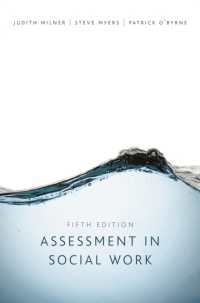- ホーム
- > 洋書
- > 英文書
- > Business / Economics
Full Description
Ever since Jim O'Neill at Goldman Sachs coined the term BRICS in 2001 there have been many different assessments of these major emerging economies, with some even proclaiming that the promise of the BRICS (comprising Brazil, Russia, India, China, and South Africa) is over. However, the so called 'arranged marriage' still seems to be working well, with the club having become a formal international forum, with summit declarations, ministerial meetings, and numerous BRICS-wide fora. Is this euphoria misplaced? Is there a BRICS model of economic and human development? Are inequalities increasing and is this the denouncement of the economic successes? Are geo-political tensions rising between these nations?
During the post COVID-19 situation, the importance of bilateral and multilateral co-operation mechanisms and institutions is becoming clear. This book focuses on one such emerging co-operation mechanism of BRICS but also more widely on those five countries and other similar economies. As a global depression looms large, global economic recovery depends on the performance of not only its largest economies but also many other important and significant economies within the so called G20 group. Even prior to the COVID-19 outbreak multilateral institutions have been under considerable strain, as with the relationship between the United States of America and China, and risks to global economic recovery appear very real. This book brings together multi-disciplinary perspectives from over sixty scholars and it presents a comprehensive and deep dive into the BRICS and emerging economies and into an understanding the political, economic, and social contexts that can help in designing approaches for recovery and regaining the last momentum in the journey towards the Sustainable Development Goals.
Contents
Section I: Introduction
1: PB Anand, Shailaja Fennell, and Flavio Comim: BRICS and emerging economies: an assessment
Section II: Economic Perspectives, Resources, and Development
2: Martin Daunton: WTO and the BRICS: a historical perspective
3: Deepak Nayyar: BRICS and other emerging economies
4: Moazam Mahmood and Florence Bonnett: Growth, employment, and social protection in BRICS
5: John Weiss: Development banks in BRICS with a focus on Brazil
6: Vinode Ramgopal and Ashish Kalra: Capitalizing the world
7: Rashmi Arora: Financial inclusion and financial stability in India
8: Mario Biggieri: Informal sector in China and India
9: Dan Meng, Yan Gao, and Xioayang Li: Rural-urban migration and its multi-dimensional impacts in China
10: PB Anand: Extractive economies, institutions, and development: Implications for BRICS and emerging economies
11: Degol Hailu: Africa's extractive economies
12: Padraig Carmody: Building BRICS in Africa
13: Richard Sidebottom: Cotton production and trade in West Africa
Section III: Social Development Challenges and Perspectives
14: Flavio Comim: Publicness and human development: an illustration from BRICs
15: David Clark: Reason, argument, and agitation: can South Africa follow in the footsteps of the BRICS countries?
16: A Dalcin, T Kang, Daiane Zanon, Felipe Bellé, Luana Betti, , Fabio Rasche Jr, Daiane Zanon, and F Comim: Education in BRICS
17: G Garibotto: Early childhood and human development
18: C. Raj Kumar: Building world class universities in BRICS: reflections
19: Kenia Parsons: Hijacking of social protection by cash transfers- the case of Bolsa Familia
20: Miguel Nino Zarazua: Social protection in Mexico
21: Alice Krozer, Stephanie Garry, and Juan-Carlos Moreno Brid: Minimum wages and inequality in Mexico: an example (not) to follow
22: S Chatterjee: The illegal trade in organs and poverty in India: a comparative analysis with Brazil and China
Section IV: Inequality and Political Economies
23: Prabir Bhattacharya and Vibhor Saxena: Demography and roots of gender inequality in BRICS
24: Sabino da Silva Porto Junior, Bernardo Frederes Kramwr Alcalde, and Izete Pengo Bagolin: Equality of opportunity in Brazil and India: an empirical exercise for the 1993-2013 period.
25: Shailaja Fennell: Women and identity: negotiating institutional pathways to claim rights in China and India
26: Lucy McMahon: Violence and the BRICS
27: Catalina Droppelmann Roepke and Nicolas Trajenberg: Inequality and crime in Latin America
28: Javier Gonzalez-Diaz: The political economy of inequality in Chile: the role of institutions and power
29: David Potts: Development and inequality in the African lions
Section V: Sustainable Development Issues
30: Tadashi Hirai: Happiness in BRICS
31: Franklin Obeng-Odoom: Cities, oil, and national development
32: Nicholay Kolev and Yue Xu: Institutional changes in the oil industry: China versus Russia
33: Olga Ulybina: Is Russia going green?
34: Terry van Gevelt: Indigenous communities, ICT and rural development: case studies in Tanzania and Sarawak, Malaysia
35: Suresh Babu and Kamiljon Akramov: Food security in Central Asia and implications for BRICS
Section VI: Governance Issues
36: Richard Jolly: Humane global governance: an area for the future where progress inches forward
37: Haider Khan: Governing a complex global financial system in the age of global instabilities and BRICs
38: Deepanshu Mohan: Governing dynamics of a changing global order: case for the developing countries
39: Paul Jackson: United Nations? The BRICS and international peace keeping
40: Cassandra Sweet: Emerging powers coalitions: India and Brazil examined
41: Sunil Tankha: Economic, political, and social transformation in Brazil: a study in disorderly progress
42: Vsevolod Samokhlov: Reshaping Eurasia: Russian and Chinese regional approaches
43: Utku Teksoz: Turkey: always at crossroads, never quite there







